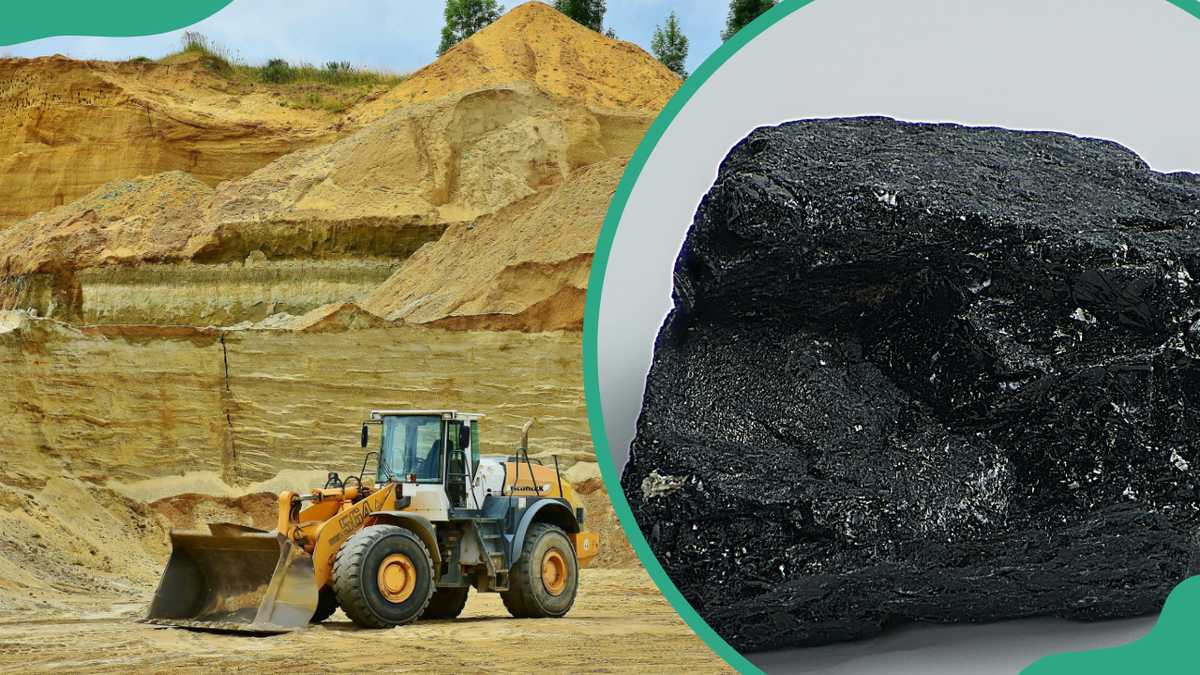By Adrianna Simwa,Bayo Olupohunda,Regina Stets,Sharon Boit
Copyright legit

Natural resources and solid minerals in Nigeria are vital to the nation’s economy. The country is rich in coal, gold, limestone, tin, and petroleum. These resources support industries, create jobs, and boost exports. Their proper use can shape Nigeria’s future.
Key takeaways
Plateau State is often called the home of solid minerals in Nigeria because of its rich deposits of tin, columbite, and gemstones.Petroleum remains Nigeria’s top resource and has made billionaires like Aliko Dangote among the richest Africans.Gold mining in Zamfara, Osun, and Kebbi has created wealth for traders and artisanal miners.Limestone from Ogun and Sokoto powers Nigeria’s cement industry and drives construction growth nationwide.
Mineral resources in Nigeria and their locations
Mineral resources in Nigeria play a vital role in daily life. They are used to make building materials, electronics, and medical devices. Minerals also support energy production, including nuclear energy. Knowing their value and using them wisely helps secure these resources for the future.
The 36 states and their mineral resources in Nigeria
The essential question in Nigeria today is where to find mineral resources. Below is the list of the 36 states and their natural resources.
The table below continues the list, showing more mineral resources and the states where they are found.
What solid minerals are found in Nigeria?
Nigeria is rich in natural resources and solid minerals that support industries and boost the economy. Below is a list of 20 mineral resources, their location and their uses across the country.
Coal is one of the oldest mineral resources in Nigeria. Found in Enugu, Kogi, and Benue, it is used for electricity generation, cement production, and steel making.
2. Petroleum
Nigeria is Africa’s largest oil producer. Petroleum, one of the most valuable natural resources in Nigeria, is mainly found in the Niger Delta states. Although the sector still faces challenges, it remains the country’s main revenue source and is exported globally.
3. Rock salt
Rock salt is abundant in Ebonyi and Benue. It is used to produce table salt and chemicals like caustic soda. It is one of the most important mineral resources in Nigeria.
4. Iron ore
Large deposits are found in Kogi, Enugu, and Niger. Iron ore supports Nigeria’s steel industry and is vital for construction and manufacturing.
5. Gemstones
Tourmaline, sapphire, topaz, and aquamarine are mined in Plateau and Kaduna. These gemstones are part of the 20 mineral resources in Nigeria, and their uses include jewelry making. They are exported for earning and serve a decorative value.
Diamonds were discovered in Katsina. Though still underdeveloped, this natural resource has potential for jewelry production and foreign exchange earnings.
Deposits in Sokoto and Ebonyi support cement and plaster industries. Gypsum is essential for construction.
Talc is a soft industrial mineral used in cosmetics, ceramics, paints, plastics, and paper. In Nigeria, it is found in Osun, Kogi, Niger, Oyo, and Ekiti states.
Cobalt is found mainly in Northern Nigeria. It is an important component in batteries and electroplating. The mineral also contributes to global demand for clean energy resources.
Gold is abundant in Zamfara, Osun, and Niger. Artisanal mining dominates, but gold remains a major export and an important mineral resource in Nigeria’s economy.
Gold is another of the natural resources besides petroleum that has made Nigerians rich. Some of the richest Nigerians built fortunes from mining and trade.
Concentrated in Plateau State, tin has been mined since colonial times. It is used in electronics and packaging.
12. Columbite
Columbite is often found with tin in Jos Plateau. It is included in the list of 20 mineral resources in Nigeria and their locations because of its importance to the country’s industrial sector. Its uses include making steel alloys and components for electronics.
13. Bitumen
Vast reserves exist in Ondo and Ogun. Bitumen is used for road construction, reducing dependence on imports.
14. Lead and zinc
Deposits in Ebonyi and Benue make Nigeria one of Africa’s top producers. They are used in batteries, roofing, and construction.
15. Limestone
Limestone is found in Ogun and Sokoto. It is essential for cement production. The mineral is the backbone of the country’s construction industry. This makes it a vital part of the list of natural resources and solid minerals in Nigeria.
Found in Benue and Plateau. Baryte is used in oil drilling and forms part of the list of natural resources and solid minerals in Nigeria.
17. Granite and marble
Available in Ogun and Kogi. They are used in building and decorative works. The granite and marble industry has created valuable employment in Nigeria.
Salt deposits in Ebonyi State supply local industries and households. It is also exported to other regions. Salt is one of the important natural resources and solid minerals in Nigeria, and its uses extend beyond food. It is also used in health care, preservation, and trade.
Deposits in Katsina and Bauchi are used in ceramics, paints, and medicine.
20. Uranium
Uranium is located in Plateau and Adamawa. It is a potential source of nuclear energy in Nigeria. This makes it one of the strategic natural resources and solid minerals in Nigeria.
What are Nigeria’s main natural resources?
They are petroleum, natural gas, coal, limestone, tin, columbite, gold, iron ore, bitumen, and lead-zinc. These solid minerals and energy resources support the country’s economy.
What is the home of solid minerals in Nigeria?
Plateau State is often called the home of solid minerals in Nigeria. It is rich in tin, columbite, and gemstones. Other states like Kogi, Zamfara, and Ogun also have vast deposits.
What are the 10 examples of mineral resources?
They are coal, petroleum, limestone, tin, gold, iron ore, bitumen, lead-zinc, gypsum, and salt. These minerals are part of the broader list of natural resources and solid minerals in Nigeria.
How to export solid minerals from Nigeria?
To export solid minerals from Nigeria, a company must register with the Corporate Affairs Commission. It also needs an export license from the Nigerian Export Promotion Council. Compliance with customs and mining regulations is required.
Natural resources and solid minerals in Nigeria play a key role in the country’s growth. They provide jobs, support industries, and drive exports. With proper management, these resources can secure a stronger future for Nigeria.
Legit.ng recently published an article on the importance of crude oil in Nigeria’s economy. Nigeria is the largest oil producer in Africa. The country depends heavily on crude oil for growth and development.
Oil shapes revenue, trade, and international standing. This article explains the importance of crude oil in Nigeria’s economy. It looks at the benefits, the challenges, and the future outlook.
Source: Legit.ng



